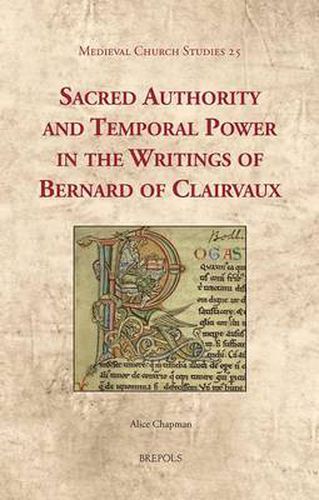Readings Newsletter
Become a Readings Member to make your shopping experience even easier.
Sign in or sign up for free!
You’re not far away from qualifying for FREE standard shipping within Australia
You’ve qualified for FREE standard shipping within Australia
The cart is loading…






The aftermath of the Investiture Controversy left the relationship between the Church and imperial power in ruins. In reaction to these developments, the Concordat of Worms in 1122 sought a compromise to restore the association between the two sides. The Concordat was only the beginning, and a spirit of cooperation between the Church and temporal powers began to emerge. This collaborative relationship is exemplified in the writings of Bernard of Clairvaux (1091-1153). Bernard of Clairvaux was both a Cistercian abbot and a major political figure in the twelfth century. He inherited the Latin vocabulary of earlier Christian writers, but needed a more nuanced language to express the complex political relationship between church and state during the settlement of episcopal investiture. In his writings Bernard distinguished between the authority (auctoritas) of the Church and the power (potestas) of temporal rulers. The language of separation was designed to delineate spheres of influence rather than to reflect opposition - a vocabulary that ultimately presents the relationship between the two powers as less of a fencing match and more of a dance. Sacred Authority and Temporal Power emphasises and enhances our understanding of the significance of Bernard’s writings for the mediation of power and authority in the twelfth century.
$9.00 standard shipping within Australia
FREE standard shipping within Australia for orders over $100.00
Express & International shipping calculated at checkout
Stock availability can be subject to change without notice. We recommend calling the shop or contacting our online team to check availability of low stock items. Please see our Shopping Online page for more details.
The aftermath of the Investiture Controversy left the relationship between the Church and imperial power in ruins. In reaction to these developments, the Concordat of Worms in 1122 sought a compromise to restore the association between the two sides. The Concordat was only the beginning, and a spirit of cooperation between the Church and temporal powers began to emerge. This collaborative relationship is exemplified in the writings of Bernard of Clairvaux (1091-1153). Bernard of Clairvaux was both a Cistercian abbot and a major political figure in the twelfth century. He inherited the Latin vocabulary of earlier Christian writers, but needed a more nuanced language to express the complex political relationship between church and state during the settlement of episcopal investiture. In his writings Bernard distinguished between the authority (auctoritas) of the Church and the power (potestas) of temporal rulers. The language of separation was designed to delineate spheres of influence rather than to reflect opposition - a vocabulary that ultimately presents the relationship between the two powers as less of a fencing match and more of a dance. Sacred Authority and Temporal Power emphasises and enhances our understanding of the significance of Bernard’s writings for the mediation of power and authority in the twelfth century.